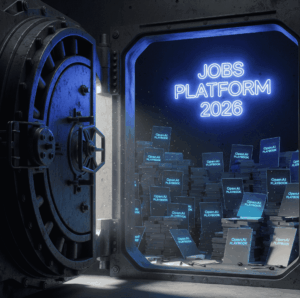OpenAI‘s Move to Jobs: The Hidden Playbook and The Job Board Opportunity?
 Guest Author: Martin Lenz, CEO of Jobiqo
Guest Author: Martin Lenz, CEO of Jobiqo
Every time a major tech player announces a move into recruiting, headlines highlight disruption and opportunity. It happened in 2023 when X acquired Laskie, and in 2017 with Google Jobs. Today, the news is OpenAI’s plan to launch a Jobs Platform in 2026.
Classifieds and transactional job boards often feel a sense of urgency or threat in these moments, worried about disintermediation or losing relevance. But reading beyond the headlines, the real story is about a known playbook of hyperscalers like Amazon, Google and Microsoft to grow their tech footprint within organisations.
For job boards, it also poses an opportunity to evolve and integrate with broader learning to increase the value it delivers to a changing talent landscape. I already shared a vision of upskilling platforms merging with job boards and skill-based matching in an Financial Times interview in 2024.
What OpenAI Is Really Building
OpenAI isn’t simply launching a job board. They are building a closed loop of learning, credentialing and employment. AI training and certification will be embedded directly in ChatGPT’s Study Mode, allowing workers to upskill seamlessly before applying for jobs, all inside OpenAI’s ecosystem.
Experts are weighing in. Josh Bersin notes this mirrors LinkedIn’s 2008 push into economic opportunity, but today the workforce challenge is AI fluency. Alex Chukovski emphasises that OpenAI is trying to straddle two objectives: general job search and AI-focused upskilling, a “have it both ways” approach that may prove difficult to sustain.
Upskilling is now central to the future of work. As we discussed with Florian Hasibar last year, co-founder of mytalents.ai, there isn’t a shortage of skilled labor but rather a shortage of required skills. The number of AI-related job ads rose 450% in 2023, demonstrating active demand for these skills.
Lessons from AWS and the CIO Playbook
OpenAI’s strategy echoes AWS Educate from years ago. It wasn’t just about training engineers. It was about making AWS certification the default credential. For CIOs evaluating new tools, the calculation is simple: if the workforce is AWS-certified, AWS becomes the default choice. Certification drives adoption, stickiness, and industry standardisation.
OpenAI appears to be following the same play. Embedding AI credentials into a widely-used tool positions them as the standard for AI fluency. For a CIO implementing AI across an enterprise, the question becomes: do we have the skills internally to integrate and sustain this technology? Certification provides the answer, creating stickiness inside organisations.
The Strategic Calculus for Job Boards
Chukovski notes LinkedIn’s scale, network effects, and employer relationships are structural advantages OpenAI cannot replicate quickly. Bersin points out that even for big tech, solving talent matching at scale is daunting. Google and Meta have struggled for the same reasons.
Transactional job platforms, which only post jobs and collect applications, are limited. Real engagement comes from integration with upskilling, credentials, and continuous candidate experience. This is where job boards can thrive: connecting trusted local relationships and niche expertise with external credential signals.
Jobiqo, for example solves this challenge with a “Hybrid Matching Engine” that combines AI algorithms with semantic technologies, enabling highly relevant job-candidate matching beyond simple keyword or title-based approaches. This has already been a proven concept to help job boards effectively take a step into the direction of skill-based matching and integration of upskilling offerings.
Early Market Reactions and Partnerships
The first reactions to OpenAI’s announcement didn’t take long. In Germany, Meinestadt quickly announced a partnership with Studydrive, signaling how local and regional platforms are moving to integrate upskilling and career tools into their ecosystems: Meinestadt × Studydrive.
Indeed was another early mover, positioning itself prominently as a key partner of OpenAI and promoting the collaboration via PR: Indeed × OpenAI. By moving fast, Indeed is leveraging the initiative ahead of competitors like LinkedIn, Stepstone, and ZipRecruiter, demonstrating the advantage of agility in the evolving AI upskilling ecosystem.
Most reactions align in the tone of OpenAI becoming a potential threat while missing the hidden strategy described above and the opportunity it may add to our industry and the environment it is embedded in. At least we can all agree that job boards are not “dead” if OpenAI launches a new job platform in 2026.
Societal Responsibility, Strategic Sourcing, and Long-Term Upskilling
Beyond the business implications, OpenAI’s move raises a broader question of societal responsibility. As AI transforms the workplace, governments, educational institutions, and platforms like OpenAI need to ensure that AI literacy scales effectively.
OpenAI’s initiative could also be a strategic sourcing tool. By certifying and tracking AI-skilled candidates, OpenAI can reduce recruitment costs for itself and its partners, potentially competing with traditional recruiting platforms like Mercor. This underscores the dual nature of the platform: it is both an upskilling ecosystem and a talent acquisition engine.
This isn’t just theory. The recent MIT study on IT pilots found that 95% of initiatives fail to deliver measurable productivity gains, highlighting the risk of poorly structured upskilling programs. By embedding certification and structured learning pathways directly into widely-used tools, OpenAI can help close that gap, providing a long-term economic benefit by preparing a workforce that is genuinely AI-ready.
Looking Ahead: Cooperation Over Competition
By controlling the core user experience, integrating verified credentials, upskilling pathways, and smart matching, job boards can retain relevance and influence while connecting global AI standards to local trust and niche expertise. OpenAI’s Jobs Platform, Indeed’s early engagement are catalysts, not threats, reminding boards that strategic adaptation and ecosystem participation are the keys to success.
Job Board Doctor Survey: LAST WEEK!
Your voice matters more than you know and it is the LAST WEEK to participate!
The Job Board Doctor Global Annual Recruitment Site Survey is your chance to shape the future of our industry, influence how platforms evolve, and make sure the real needs of job boards are heard loud and clear.
👉 Survey Link: https://www.surveymonkey.com/r/G6NZP97

Comments (0)